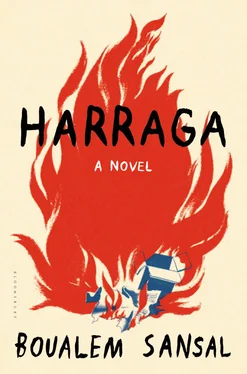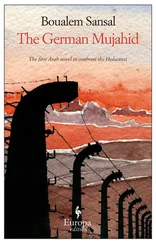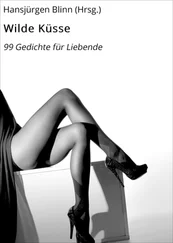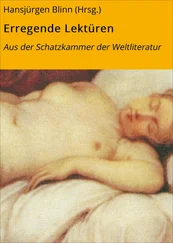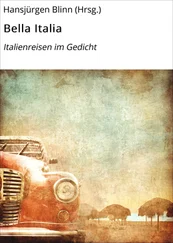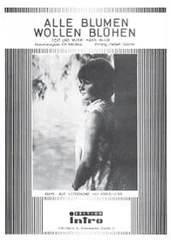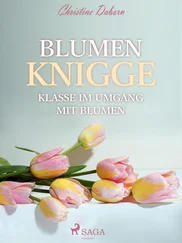On the fateful day when she left here, Chérifa went into the town centre. This is where waifs and strays converge, the illegal immigrants, the unemployed, the tramps and all the little creatures that the economic reforms have forced to turn tricks for 300 dinars an hour on the byroads off the straight and narrow. Here in the heart of the city, abject poverty meets garish luxury beneath the all-seeing eye of God and his representatives. There’s nothing to be done about it, even Hercules would wear himself down trying to understand the topography. In fact the place reminds me of Rachid Boudjedra’s novel Ideal Topography for an Aggravated Assault , the story of a Kabyle who arrives in Paris from a rocky peak in the Djurdjura and goes round and round and round on the métro, astonished by everything he sees in this never-ending tunnel only to finally succeed in getting himself murdered. He never manages to see the sun shine in Paris or enjoy the peace of its streets. Which in turn reminds me of Camus’s L’Étranger , which has Meursault going round and round and round in the luminous meanders of Algiers until he finally meets an Arab by a sand dune, can’t understand him, and kills him stone dead. The same tragedy, the same unfathomable humanity.
A hundred metres uphill is the seat of government, though that’s not really what has people flocking here. A hundred metres downhill is the harbour, with its tubby boats and an army of freight agents afflicted by facial tics. A hundred metres to the left is the Commissariat of Police with its army of informants. A hundred metres to the right is the Kasbah with its inscrutable mysteries. In the shadow of La Grande Poste, in the middle of the square, is the one and only entrance to the famous Algiers métro which has been a boon and a nightmare for five successive presidents, twenty governments and two thousand utterly insignificant deputés . Ten times it has been inaugurated, and each time we believed this was the one. The entrance is a fantasia of pink marble and anodised bronze used to great effect. It is possible to go down into the station but the tunnel leads nowhere, it simply trails off into the muddy depths and the prehistoric magma. It sometimes seems as though from the bottomless ventilation shaft, you can hear people whispering in Chinese. As it waits for its trains and its satisfied commuters who, we are assured, will arrive within six months, the passageways serve as a shopping arcade for the local fauna. One person’s loss is another person’s gain. Here, luxury items are sold, dope, guns, forged identity papers, counterfeit money, merchandise which arrives via the port, the Commissariat, the Government Annexe, the Kasbah, the post office.
There’s no need to look, everything is within reach. The place is teeming. Here the little people do their shopping far from laws and from harassment. From an aerial viewpoint, you’d swear they were free electrons, but no, they are controlled by gravitational force. The area attracts teenage runaways the way nectar attracts bees. They’ve been told that this is the gateway to a new life and that, as with any travel agency, there are endless choices of destination. Two hundred metres away, abutting the harbour walls in glorious confusion, stand the bus and train stations and between them, on a patch of waste ground, are the gypsy cabs, a riot of clapped-out rustbuckets, every one in perfect working order. ‘Direct from producer to consumer’ is a slogan from the socialist era, but it applies perfectly to the black market.
The elegant women of Algiers also frequent the square; it is the only place where they can find perfume from Paris imported from Taiwan via Dubai. People say that at customs the sniffer dogs are trained not to smell perfumes but that’s just a joke the kids tell; in fact in Algiers there are no sniffer dogs in customs — if there were all hell would break loose. The elegant ladies turn up here dressed like paupers hoping to pass unnoticed but their pale complexions and their strange lisping accent give them away and prices are hiked up.
‘She came up to me outside La Grande Poste. I… I buy imported perfume there… you can’t find anything in the shops.’
‘I get what I need from Tata Zahia who used to work at the Union. She runs a little shop from home. It’s all good stuff, and direct from Paris, too, if you please! She’s a genuine trafficker, honest, friendly, she’ll even have a little chat over a glass of mint tea. Sometimes there are fifty people there and we have a party. She has a cousin who’s a minister and he supplies her on the quiet. I’ll recommend you. So, what happened next?’
‘I brought her back to my rooms in the halls of residence… I felt sorry for her…’
‘Did she have her holdall?’
‘What?’
‘Her clothes, her gear.’
‘Um… yeah.’
‘So how is she? I mean the pregnancy… is she eating properly?’
‘Um… yes. I couldn’t let her move in with me, my room is tiny… besides I need peace and quiet to study… and anyway, it’s against the rules…’
‘So where does she sleep?’
‘Sometimes my room, sometimes one of the other girls… we organised a rota… whenever she needs to move, we distract the caretaker. During the day, she goes for a walk in the city, and…’
‘And?’
‘…’
Chérifa is slippery as an eel. After a week of doing nothing, of strolling in the sunshine, she hooked up with a homeless man who smelled of damp straw, he was succeeded by some useless cop, then an incompetent journalist and now, apparently, she’s run off with an airline pilot we don’t know the first thing about beyond the fact that he dresses too well to be honest.
‘We’re worried. She’s been gone a week now. The girls are really fond of her, she’s so happy-go-lucky but she… um… well she’s due any day now so she shouldn’t be…’
They’ve clearly been charmed by the siren song of my Lolita.
‘I know, I know.’
‘So what do we do?’
‘Track down the pilot, it can’t be that difficult, there’s only one airline in this country last time I checked. It’s called Air Algérie, right? We’ll just wait until he ejects from his glider.’
‘I… um… I don’t want any trouble…’
‘I’ll deal with everything. I’ll pop in and see him unexpectedly, the same way you came to see me. Did Chérifa give you my address?’
‘Not exactly… I had to search. She talked about you all the time, about Rampe Valée, the Turk’s palace, the Frenchman’s castle, the Jew’s shack, the Kabyle’s cave… I… um… I couldn’t understand why the house had so many names.’
‘It’s history, it’s complicated. So, what then?’
‘She mentioned the Hôpital Parnet, she talked about your friends, about Mourad, Sofiane, Monsieur 236.’
‘ 235! I’m not intimate with every driver who works for GAUTA!’
‘Sorry, Monsieur 235… Missing Parts and Bluebeard, the gorgon from the rue Marengo… and… well… your ghosts… the ones in the house, I mean.’
‘Well how do you like that? A veritable menagerie!’
‘She’s very fond of you, and she really is very sorry. One day she actually went to see you at the hospital and she came back so upset… You were in a terrible mood and she didn’t dare talk to you.’
‘Let’s dispense with sentimentality for the moment, just give me the facts. So what happened next?’
‘…’
I choked back my tears, I would have to hear this drama out to the bitter end if I was to understand.
So, she had met some peasant in the woods next to the university campus. It’s the sort of place that attracts lovers trying to get away from prying eyes and radical preachers. Our two country bumpkins meet and realise they are kindred souls and before you know it they’re embroiled in some vegetarian discussion. They pretend they’re living in a commune, they draw up a list, life is beautiful. Their little game lasts a week before things turn sour. ‘ He’s as much fun as a lizard, ’ she said. That’s Chérifa all over, the minute she’s bored, she’s off.
Читать дальше
